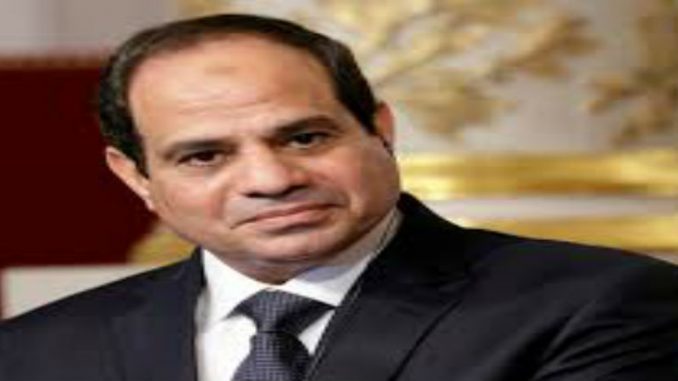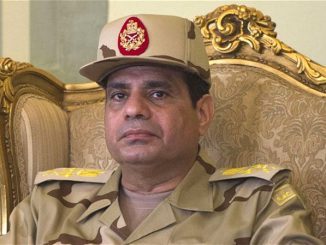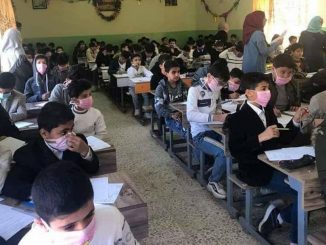
A delegation headed by Governor of the Central Bank of Egypt (CBE) Tarek Amer has left for London on a five-day visit to promote investment in Egypt.
During the visit, the delegation will meet with officials of key companies, investment banks and financial institutions to post them on the latest positive economic developments in Egypt and the economic reform program, according to Egypt’s State Information Service.
Egypt has taken extreme measures recently to revive its wrecked economy that undergoes one of its harshest crisis in the its history.
The economic conditions has deteriorated in an unprecedented way under his al-Sisi’s rule.
Tourism and foreign investments, the two sources for foreign currency, have declined as a result of political instability and lack of security.
The withdrawal of the two main sources of foreign currency led to a severe shortage in foreign currency.
As a result, the Egyptian pound rate has fallen compared to the US dollar and the black market flourished on the currency expense and led to inflation.
Last November, the International Monetary Fund’s executive board approved Egypt’s request to secure $12 billion loan facility after Egypt met its requirements.
On August 30 Egypt started its first steps towards the loan when Egypt’s parliament approved a long-awaited law introducing a value-added tax (VAT) of 13 %, rising to 14% in the next fiscal year.
On November 3, the Central Bank of Egypt floated the Egyptian pound and gave up trying to peg the currency to the US dollar allowing it to devalue by almost half.
On November 4, Egypt took another unprecedented decision, which has always been abandoned by former leaders in fear of public unrest, to cut subsidies for fuel leading to jump in prices.
However, despite taking all these drastic steps, the IMF loan alone won’t help as the North African country still needs to revive its internal sources to allow the flow of foreign currency within the country and thus, stabilizes its currency and contains its inflation rate.
It is noteworthy that the inflation rate has hiked recently after floating the Egyptian pounds.
According to a statement issued by the Central Agency for Public Mobilization and Statistics (CAPMAS), the annual Inflation rate hiked to 24.3% in December, compared to 20.2% in November.
The statement attributed the increase of the inflation rate to price hikes in the food and beverage sector, as they registered an increase of 29.3%, representing a 15.12% increase in the Consumer Price Index (CPI).
In this context, Tarek Amer, the governor of the CBE, traveled to Britain to attract investments in Egypt, especially that Britain’s relations with Egypt have intensified since the military coup in 2013.
Abdel Fattah al-Sisi, the former defense minister who led a military coup, has eased the British investments in Egypt especially in the energy field.
The Huffington Post has published an article titled: “Britain and The Military Rulers of Egypt-Another Extraordinary Special Relationship”, confirming that the UK’s new relationship with the autocratic military government in Egypt is worrying as it wrote that since the military coup led by General Abdel Fattah al-Sisi against Egypt’s first democratically elected president Mohamed Morsi in July 2013, “Egypt has once again become a nasty, repressive regime.”
The British government has been accused of undermining the human rights violations in Egypt under al-Sisi’s rule for achieving security and economic benefits.
Britain has perceived Morsi’s government and the Muslim Brotherhood as a serious obstacle for oil and gas deal.
The BP-led consortium had been haggling over the terms for the West Nile project for years and was seeking direct ownership over the resources and accrual of 100% of the profits that Morsi government and with some leading figures objecting BP’S demands.
Indeed, by mid-2013, just weeks before the coup, Morsi government was engaged in talks with BP demanding far better terms.
However, when al-Sisi captured power all this has changed and now a new deal under the military regime” offers BP exceedingly generous terms and, most importantly, has moved Egypt away from a long-used production-sharing model in which companies and countries typically split profit 20:80, to a tax royalty scheme that essentially privatizes Egypt’s gas sector and hands control and oversight of natural resources to private companies,” said the Huffington Post.
Moreover, British Petroleum(BP) has signed amendments last September to the Temsah, Ras El Barr and Nile Delta Offshore concessions in Egypt, allowing for the development of the Nooros field, the company said, according to Reuters.
Reuters reported that BP holds a 50% interest in Temsah and Ras El Barr, and a 25 %interest in the Nile Delta Offshore Concession. The remaining working interest is held by ENI through its subsidiary IEOC.
It seems that the Egyptian delegation traveled to UK to see what the British investments can offer to help reviving the Egyptian economy.



